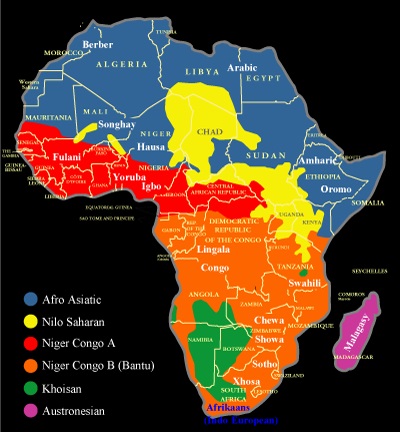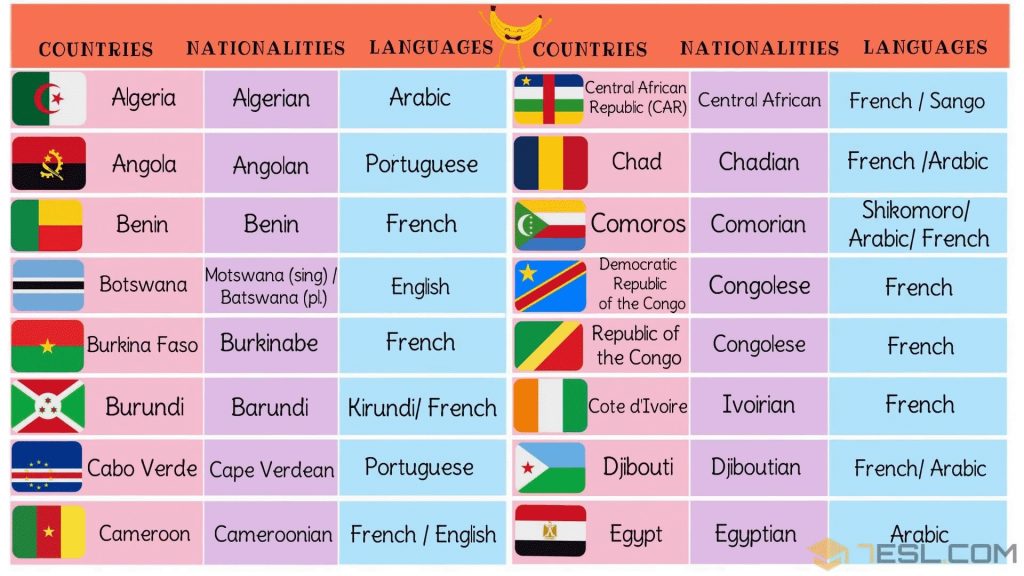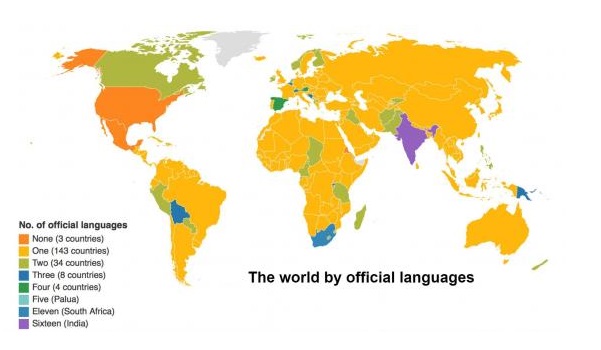Africa is known for its rich cultural heritage, diverse wildlife, and breathtaking landscapes. However, one aspect often overlooked is the vast array of African languages on the continent.
Africa is home to over 2,000 different languages, each with its unique history, grammar, and vocabulary. This is around one-third of all languages in the world. From widely spoken languages like Swahili and Arabic to lesser-known tongues like Khoisan, the diversity of African languages is truly remarkable.
Not only is this linguistic diversity a testament to Africa’s rich cultural heritage, but it also plays a vital role in preserving and promoting the continent’s unique identity.
In this article, we will explore the importance of African languages and why they are an important part of the continent’s cultural fabric.
The Diversity of African Languages
Geographically, African languages can be divided into several regions. Arabic is the dominant language in North Africa, with dialects varying from country to country. Berber languages are also spoken in North Africa, particularly in Morocco and Algeria.
West Africa is home to several major language families, including Niger-Congo, such as Yoruba, Igbo, and Swahili, as well as the Afro-Asiatic family, such as Hausa and Fulfulde. In Central Africa, Bantu languages are the most common, while in East Africa, Swahili is widely spoken, along with other languages like Amharic and Somali.
Southern Africa is home to a diverse range of languages, including the Khoisan family of click languages, as well as Bantu languages like Zulu and Xhosa.

One reason for the diversity of African languages is the continent’s complex history. With over 3,000 distinct ethnic groups, each with its cultural traditions, Africa has a rich and varied linguistic landscape.
Colonization and the slave trade also played a role in shaping the continent’s linguistic diversity. European colonizers imposed their own languages on African territories, displacing and marginalizing indigenous languages.
However, despite these challenges, many indigenous languages have survived and continue to thrive.
The Importance of African Languages
African languages are so important due to their role in preserving cultural heritage. A language is a powerful tool for transmitting knowledge, stories, and traditions from one generation to the next.
For many African communities, language is deeply intertwined with cultural identity, providing a way to express cultural values, beliefs, and practices. Without these languages, much of this rich cultural heritage could be lost, leading to a loss of identity and connection to the past.
Indigenous languages also play a huge role in promoting the continent’s unique identity. With so many different ethnic groups and cultural traditions, linguistic diversity is a defining feature of Africa.
Each language reflects a different aspect of African culture, from the Swahili language’s influence in East Africa to the Hausa language’s significance in West Africa. Promoting linguistic diversity allows African communities to celebrate their unique cultural heritage and challenge stereotypes about the continent.
In addition to cultural significance, African languages also have practical applications. They facilitate communication and understanding among different communities. This makes it easier to conduct business, negotiate, and build relationships.
In multilingual societies, language can also be a source of social cohesion, providing a shared identity and sense of belonging. Furthermore, local languages can help to promote economic development by providing a means for communication and collaboration among diverse communities.
Read: The Impact of European Colonialism on African Societies and Culture
Challenges Facing Native Languages
One of the major challenges facing African languages is language shift and loss. Younger generations often prefer to learn and speak dominant languages, such as English, French, or Arabic, rather than their own local languages.
This is due to various reasons like the perceived economic advantages of speaking dominant languages, the influence of media, and the lack of recognition and value for native tongues.

Another challenge is limited resources for language preservation and education. This has led to the extinction of over 200 African languages.
Many African countries face significant economic and social challenges, and language preservation and education may not be seen as a priority. Language teaching materials, teacher training, and language research are often underfunded or nonexistent.
We Design & Develop Websites, Android & iOS Apps
Looking to transform your digital presence? We specialize in creating stunning websites and powerful mobile apps for Android and iOS. Let us bring your vision to life with innovative, tailored solutions!
Get Started TodayFortunately, organizations such as UNESCO, African World Heritage Fund, Free Knowledge Africa, etc., are making efforts to document and preserve tangible and intangible African cultural heritage.
Furthermore, some native languages lack standardized written forms. This means there is no standard way to write or spell words, making it difficult to develop educational materials, dictionaries, and other language resources. This lack of standardization can also lead to confusion and miscommunication, hindering the use and promotion of these languages.
Another challenge is the lack of institutional support for African languages. Many African countries have official languages inherited from their colonial masters. These former colonizers provide support, such as funding for education and translation of their languages. However, indigenous languages may not receive the same level of support, leading to their marginalization and loss.
Additionally, the dominance of English, French, and Arabic in education and governance can lead to a preference for these languages over indigenous languages. This can lead to a lack of proficiency in African languages, making it difficult for individuals to communicate with their communities and access cultural resources.
Strategies for Promoting Indigenous Languages
Below are some strategies that may help in promoting African languages and preserving their rich cultural heritage:
Digital Technologies
One strategy for promoting African languages is through the use of digital technologies. With the increasing availability of digital resources, creating and disseminating language resources and courses online has become easier.
This can include the creation of online language dictionaries, language-learning apps, and e-books. Digital technologies can also be used to preserve oral traditions and stories, which are an important aspect of many African cultures.
Language Nests
Language nests are early childhood education programs that promote the use of African languages among young children. These programs provide a safe and supportive environment for children to learn and use their mother tongue.
By promoting the use of African languages at a young age, language nests can help to preserve and promote these languages for future generations.
Incorporation into Formal Education Systems
African languages can also be promoted by incorporating them into formal education systems. This can include developing language teaching materials, teacher training, and research.

By providing formal education in African languages, students can gain proficiency in their mother tongue. This can help to preserve the language and promote its use in the community.
Community-Based Language Revitalization
This involves working with local communities to preserve and promote their languages. This can include the creation of language committees, language festivals, and language immersion programs.
Government and Institutional Support
Promoting African languages requires more significant support from governments and institutions. This can include funding for language teaching materials, teacher training, and research. It can also include the recognition and value of African languages in official policies and programs.
Institutional support for African languages will ensure greater visibility and importance, leading to their preservation and promotion.
We Design & Develop Websites, Android & iOS Apps
Looking to transform your digital presence? We specialize in creating stunning websites and powerful mobile apps for Android and iOS. Let us bring your vision to life with innovative, tailored solutions!
Get Started TodayCultural Programs and Events
These can include music, dance, theatre, and storytelling performances in African languages. These events can attract a wide audience, including younger generations who may not speak the language.
Read: 10 African Music Festivals You Must Attend in Your Lifetime
Showcasing the beauty and importance of African languages through cultural events can make more people interested in learning and using these languages.
Partnership with the Private Sector
Companies can develop language learning tools and resources for African languages and support language revitalization programs.
They can also incorporate indigenous languages into their marketing and branding efforts. This, in turn, can raise awareness and recognition of these languages among wider audiences.
Collaboration with Academia
Universities and research institutions can support language preservation and research efforts. They can also incorporate African languages into their curricula, offering courses and programs in African languages. This can help increase the prestige and value of African languages, leading to greater recognition and use.

Advocacy and Awareness
Finally, advocacy and awareness can go a long way in promoting native tongues. Raising awareness about the importance of native tongues and their challenges can lead to greater support and investment in language preservation and promotion efforts.
Advocacy efforts can also help to ensure that local tongues are given greater recognition and value in official policies and programs.
Action must be taken to promote and preserve linguistic diversity in Africa. Without action, the loss of indigenous languages could have significant consequences for African cultures and communities and global linguistic diversity.
However, as individuals, there are several actions we can take to promote linguistic diversity in Africa. We can start by learning and using native languages.
Learning a new language can be challenging, but it can also be rewarding and enjoyable. By learning indigenous languages, we can gain a deeper understanding of African cultures and contribute to preserving and promoting local languages.
We can also support language revitalization efforts. This can include supporting community-based language programs, attending language festivals and cultural events, and advocating for greater institutional support for African languages.
As institutions, some actions can be taken to promote linguistic diversity in Africa. Institutions can incorporate native languages into formal education systems, providing language teaching and learning resources and support. Institutions can also partner with communities and organizations to support language revitalization efforts and provide funding and resources for language preservation and research.
Governments can also play a significant role in promoting linguistic diversity in Africa. This can include funding for language teaching materials, teacher training, research, and the recognition of African languages in official policies and programs.
Before you go…
Hey, thank you for reading this blog to the end. I hope it was helpful. Let me tell you a little bit about Nicholas Idoko Technologies. We help businesses and companies build an online presence by developing web, mobile, desktop, and blockchain applications.
We also help aspiring software developers and programmers learn the skills they need to have a successful career. Take your first step to becoming a programming boss by joining our Learn To Code academy today!
Put Your Tech Company on the Map!
Get featured on Nicholas Idoko’s Blog for just $200. Showcase your business, boost credibility, and reach a growing audience eager for tech solutions.
Publish Now










